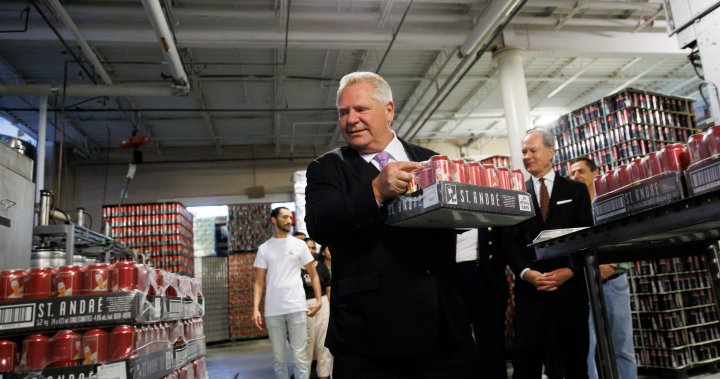Breaking News
Independent outlets, convenience store chains sign on to Ontario’s alcohol expansion

Exactly one month since the province started letting convenience stores sell alcohol, leading figures in the industry say they would give it “nine out of 10” for success and have found themselves forced to restock almost weekly.
On Sept. 5, the Ford government finally delivered a promise it had made six years earlier, by allowing convenience stores to stock beer, wine and ready-to-drink beverages.
The move saw the government pay the privately-owned Beer Store a quarter of a billion dollars and triggered a weeks-long showdown with the union representing LCBO workers, who feared the change would lead to mass layoffs and closures.
A month after the change came in, however, convenience store owners say they’re delighted with how things have panned out.
“From what I hear, we’ve been ordering three, four times already and it’s only been (a few) weeks. I myself have ordered three, four times because I didn’t expect it to move that fast but everyone’s telling me it’s moving at a really, really good pace,” Kenny Shim, president of the Ontario Convenience Store Association, told Global News’ Focus Ontario.
“Ten out of 10? Maybe not. But nine out of 10 for sure, there’s a lot more to be done.”
Ontario Finance Minister Peter Bethlenfalvy said he has to “pinch” himself sometimes because the rollout is going better than he could have predicted.

Get daily National news
Get the day’s top news, political, economic, and current affairs headlines, delivered to your inbox once a day.
“I travel all over Ontario, people are coming up to me and they don’t see me as the finance minister, they see me as the guy who got alcohol into a convenient location for them,” he said.
Bethlenfalvy said it was “too early to tell” if the 4,539 new convenience store locations selling alcohol were leading to an uptick in sales taxes but said he was “optimistic.”
The true cost of Ontario’s historic alcohol sales change remains a fierce point of debate between the government and its critics.
A calculation from the Ontario Liberals suggested after the rollout was announced the final price tag of the move would be north of $1 billion. The party said the province would be hit on four fronts through the new deal: money for The Beer Store, LCBO rebate fees, a wholesaler discount and lost licence fees.
The government has disputed that figure but it has not released its own calculations as to how much money could be lost through the move. While a parliamentary watchdog report will offer an estimate in early January, the finance minister remains tight-lipped.
“I’m not concerned about the LCBO at all,” Bethlenfalvy said, reiterating a promise not to move spirits and liquor out of the provincial store, in response to questions about its potential losses.
“I said when we modernized in May of ’24 when we made the announcement, we’ve said all the way through, we’ll update the numbers in the fall economic statement.”
The role of 7-Eleven, Circle K and others
It is not yet clear which businesses will benefit the most from the rollout of beer, wine and ready-to-drink beverages to convenience stores in Ontario.
Data from the Alcohol and Gaming Commission of Ontario, which hands out licences to sell beer in corner stores, shows some corporations have taken a chunk of the spots to sell booze.
For example, 183 Shell Canada locations have been granted licenses, along with 72 operations under the Avondale Stores brand. Sixty-one MacEwen Petroleum stores have licences, as do 58 7-Eleven outlets.
The data also shows more than 500 Circle K franchise outlets are now selling alcohol across the province.
A spokesperson for the minister of finance stressed the rollout — to independent stores and chains — would result in job creation.
“This change is providing new support and opportunities for thousands of Ontario small businesses while creating more jobs across our province,” they said.
One small business group told Global News that, while they’re happy with how the licences have been managed so far, they’re watching carefully to ensure big chains don’t receive preferential treatment in the future.
“We would not take issue with this as long as the distribution is fair — that would be both the distribution of the licences themselves and the distribution of alcohol,” said Julie Kwiecinski, director of provincial affairs for Ontario at the Canadian Federation of Independent Business.
“When we see any elements of where the big business is treated differently, or given preferential treatment, then obviously we would take issue. And again, it’s early days, that’s something we need to monitor and so far we haven’t been hearing (those issues) from anyone.”
© 2024 Global News, a division of Corus Entertainment Inc.
-

 Destination8 months ago
Destination8 months agoSingapore Airlines CEO set to join board of Air India, BA News, BA
-

 Breaking News9 months ago
Breaking News9 months agoCroatia to reintroduce compulsory military draft as regional tensions soar
-

 Tech News11 months ago
Tech News11 months agoBangladeshi police agents accused of selling citizens’ personal information on Telegram
-

 Breaking News9 months ago
Breaking News9 months agoBangladesh crisis: Refaat Ahmed sworn in as Bangladesh’s new chief justice
-

 Productivity11 months ago
Productivity11 months agoHow Your Contact Center Can Become A Customer Engagement Center
-

 Toys11 months ago
Toys11 months ago15 of the Best Trike & Tricycles Mums Recommend
-

 Guides & Tips9 months ago
Guides & Tips9 months agoHave Unlimited Korean Food at MANY Unlimited Topokki!
-

 Gadgets3 months ago
Gadgets3 months agoSupernatural Season 16 Revival News, Cast, Plot and Release Date


























